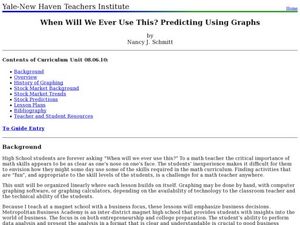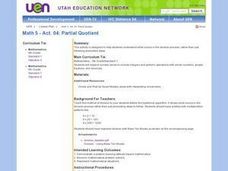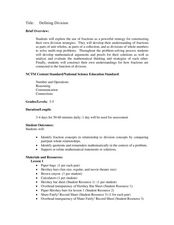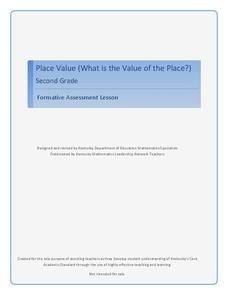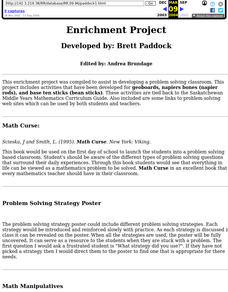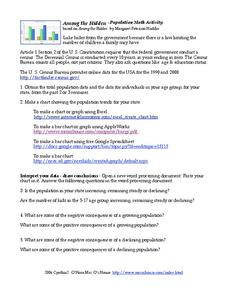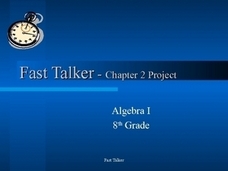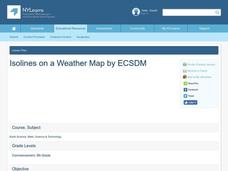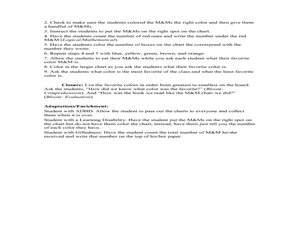Curated OER
When Will We Ever Use This? Predicting Using Graphs
Here are a set of graphing lessons that have a real-world business focus. Math skills include creating a scatter plot or line graph, fitting a line to a scatter plot, and making predictions. These lessons are aimed at an algebra 1 level...
Curated OER
Partial Quotient
Learners study what occurs in the division process, rather than just following prescribed steps. They expand number sense to include integers and perform operations with whole numbers, simple fractions, and decimals. They write a word...
Curated OER
An Introduction To Volume
Upper graders explore the topic of volume. In this math lesson plan, pupils count volume in cubic units, multiply to find volume, estimate volume, write a multiplication sentence to find the volume, and make a cost analysis of different...
Curated OER
Defining Division
Upper graders explore division through fair-shares. They will review fair shares and fractions as a segway into division. They start by playing "Share Fairly" game and create mathematical arguments for solving problems. Manipulatives and...
Curated OER
Collecting Data to Learn About the People Around You
Human graphs, anyone? Did you eat fruit today? What is your favorite costume? Have your K – 6 learners graph the responses. Early elementary grades may count and compare while upper grades compare responses of different groups or make...
Curated OER
Place Value - What Is the Value of the Place?
Second graders build number sense in an activity that requires the matching of base 10 representations to numbers. It is the teachers responsibility to gauge student understanding and involvement while class members work in groups.
Curated OER
Human Coordinate Plane: An Array of Desks
Use a kinesthetic activity to elucidate ordered pairs and coordinate planes. Arrange desks in a square array and distribute to learners cards with ordered pairs based on the locations of their seats. By having various groups of learners...
Raytheon
Adding and Subtracting Decimals
For this adding and subtracting decimals instructional activity, learners add and subtract numbers with decimals in word problems. Students complete 12 word problems.
EduGAINs
Introduction to Solving Linear Systems
Word problems offer class members an opportunity to learn the concept of solving linear systems using graphs. Individuals choose a problem based upon preferences, break into groups to discuss solution methods and whether there is...
Brigham Young University
The Giver: Magic Squares
Combine math and vocabulary in a fun activity based on Lois Lowry's The Giver. Before kids begin the book, they look up the definitions of 16 vocabulary words and complete a puzzle that will give them the same number.
Curated OER
Genome: The Secret of How Life Works
What do you have in common with a fruit fly? About 60 percent of your DNA. The resource, divided into two units, is intended for grades four to eight and another for high schoolers. Both units include eight lessons covering the genome as...
Curated OER
Enrichment Project
Pupils create enrichment activities for Geoboards, Napier Rods, and Bean Sticks. This includes annotated links to problem solving Internet Sites.
Curated OER
Among the Hidden - Population Math Activity
In this population worksheet, students collect data on population by researching the Census Bureau and then make online graphs and answer short answer questions about the data. Students complete 5 problems total.
Curated OER
Egyptian Hireroglyphs
Fifth graders identify the aspects of Ancient Egyptians and Heiroglyphs. They compare and contrast Egyptian Hieroglyphs with the decimal number system. Students recognize the decimal number system and compares to bases other than ten.
Curated OER
Fast Talker - Ch 2 project
Tongue Twisters?! Create scatter plot graphs based on timing fellow classmates saying tongue twisters. Then investigate, display, and analyze the relationships based on functions. Wrap up this activity by making a poster or other...
Curated OER
Investigation - Who is Right?
Third graders investigate two mathematic scenarios and determine which is correct. They compare adding columns and places (such as the tens place, hundreds place, and so on) and familiarize themselves with how to add larger numbers.
Curated OER
Isolines on a Weather Map
Ninth graders recognize isolines on a weather map and draw isolines based on temperature data on a weather map. They draw isotherms on a weather map to identify temperature patterns.
University of Exeter
Angles and Turns
Junior geometers investigate the concepts of angles and turns using straws to perform a hands on activity. This is helpful for kinesthetic learners who have a hard time with mathematics. The lesson plan includes the dialogue to be used...
Curated OER
Place Value Lessons
Students can learn about place value using interesting lessons, activities, and games.
Curated OER
M&M Counting Chart
Students practice classifying objects while utilizing candy. In this sorting lesson, students observe an assortment of M&M's and analyze the candy based on color. Students create a color chart based on the number of different colored...
Curated OER
Mental Multiplication and Division
Students practice multiplication and division problems using mental math. They play the online game ArithmAttack to complete as many multiplications or divisions as possible in 60 seconds. Afterward, they complete a paper based follow up...
Curated OER
Aquaculture
Learners examine an experiment in which 2 types of commercial fish are fed a new type of fish feed and a commercial fish feed which costs ten times as much. They calculate in the fish grow as well with the cheaper fish feed and then...
Math Mammoth
Finding the Area of Rectangles, Parallelograms, and Triangles
In this area of polygons activity, 9th graders solve two area of rectangles, one area of parallelogram, and ten area of triangles problems. The formulas for finding the area of these figures are provided.
Curated OER
Fourth Grade Mathematics Test
In this math activity, 4th graders complete multiple choice questions about multiplication, fractions, rounding, and more. Students complete 29 questions.


